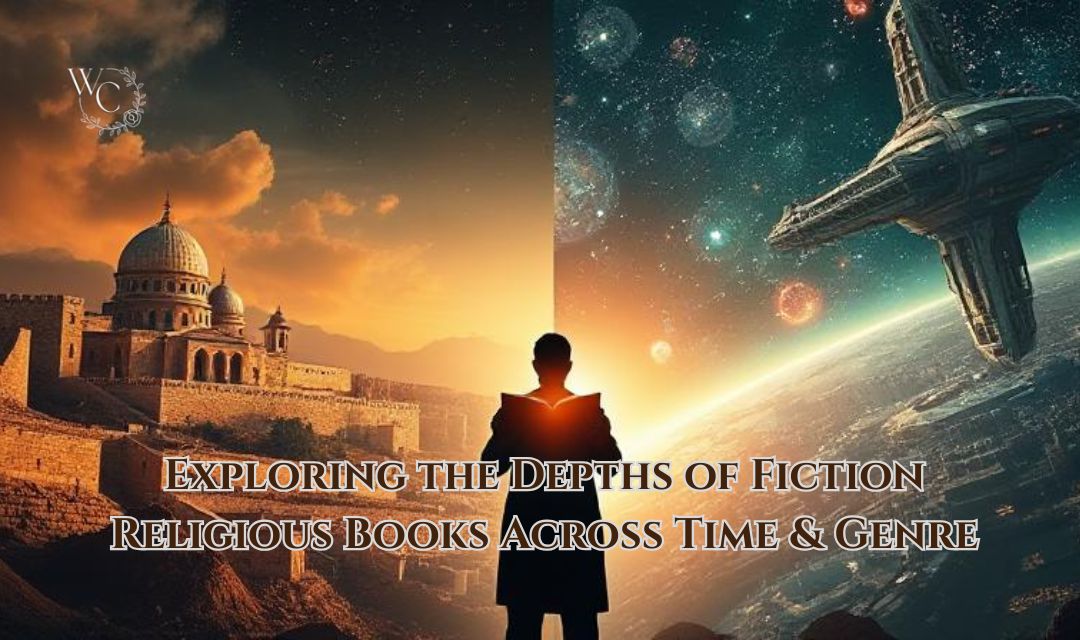In the dynamic landscape of American literature, fiction religious books continue to hold a unique space, resonating with readers who seek more than entertainment—they want meaning, history, and moral clarity. From historical religious fiction books set in ancient Jerusalem to religious sci fi books projecting faith into the cosmos, the genre blends timeless truths with imaginative storytelling. For authors like William Copeland, whose Exiled series exemplifies this fusion, religious fiction isn’t just storytelling—it’s a vehicle for spiritual reflection and cultural dialogue.
Why Religious Books Endure in American Literary Culture
In the United States, religious books have long been a cornerstone of personal and cultural development. From colonial sermons to 20th-century moral allegories, readers turn to faith-based literature for guidance and perspective. As the country becomes more pluralistic, religious fiction books offer a safe yet provocative space to wrestle with existential questions.
Americans, particularly Baby Boomers and Gen X, still rank spiritual content among their top preferred reading categories, especially within the genres of fiction religious books and fiction history books. In a society grappling with moral complexity and cultural change, novels that explore faith in tangible, human terms provide comfort, inspiration, and insight.
Historical Religious Fiction Books: Reimagining Sacred Moments
One of the most compelling sub-genres, historical religious fiction books, brings ancient scripture and history to life. William Copeland’s Exiled exemplifies this approach by dramatizing the fall of Jerusalem through a lens of personal sacrifice, cultural upheaval, and enduring faith. The inclusion of a scribe, a midwife, and ordinary citizens elevates the narrative from ancient chronicle to relatable human drama.
This sub-genre is especially popular among American readers who appreciate biblical narratives but crave depth, character development, and historical accuracy. The best historical religious fiction books blend scholarly insight with emotional storytelling, offering more than doctrine—they offer a window into how faith was lived.
Key Characteristics of High-Impact Historical Religious Fiction:
- Richly developed characters grounded in scripture or history
- Authentic cultural and geographic settings
- Themes of judgment, hope, covenant, and resilience
- Tensions between divine sovereignty and human agency
Exiled: The Journey, Copeland’s upcoming sequel, continues these themes while expanding into exile, displacement, and reconciliation—parallels many Americans see in today’s geopolitical crises and personal spiritual struggles.
Religious Sci Fi Books: Faith Beyond the Stars
While not as mainstream as other sub-genres, religious sci fi books are gaining traction in the U.S., especially among younger readers and tech-savvy audiences. These stories extend spiritual dilemmas into futuristic worlds: What does redemption look like in a post-Earth society? Can AI experience a soul? How does faith survive space colonization?
This niche genre allows authors to explore theology through speculative scenarios. It’s ideal for American readers who love both faith and science, and who are asking big questions about the future of spirituality in a digitized world.
U.S. Market Trends for Religious Sci-Fi:
- Increased demand on platforms like Kindle and Audible
- Blending of Christian themes with space opera or dystopia
- Ideal for fans of C.S. Lewis, Madeleine L’Engle, and Ted Dekker
- High search volume for “Christian science fiction” and “faith-based futuristic novels”
Fiction Religious Books That Speak to Modern America
Religious fiction books must resonate with modern concerns: justice, identity, trauma, and healing. In Exiled, Leah’s desperate attempt to save her child from sacrifice speaks powerfully to modern readers concerned with human trafficking, systemic oppression, and moral compromise. Similarly, Ovadyah’s mission to preserve sacred writings echoes present-day struggles to protect cultural heritage under duress.
Whether the setting is ancient Jerusalem or a near-future dystopia, the enduring themes are the same—faith under fire, moral clarity in chaos, and hope that transcends suffering. These are not just fiction history books—they are mirrors to our own lives.
Meeting Reader Pain Points: What U.S. Audiences Want
Today’s U.S. audience seeks more than surface-level storytelling. They want:
- Authenticity: Are the characters believable? Is the theology sound?
- Relevance: Does the story speak to today’s challenges—mental health, war, justice?
- Depth: Are spiritual struggles depicted with nuance and honesty?
William Copeland’s work meets these demands by weaving multiple character arcs that reflect diverse spiritual and emotional journeys. Each storyline offers the reader a chance to see themselves—or someone they love—wrestling with questions of faith and purpose.
Why William Copeland Is a Thought Leader in Religious Fiction
William Copeland brings not only literary skill but lived experience—military service, theological training, and firsthand historical study. His time spent in Israel, standing on ancient ruins at Tel Lachish, deeply informs the realism and reverence in his storytelling. This blend of scholarship, faith, and life experience positions him as a credible voice in the world of religious fiction.
The Exiled series isn’t just a collection of books—it’s a contribution to the broader conversation around faith, identity, and resilience. By aligning storytelling with cultural insight, Copeland offers American readers fiction that matters.
Final Thoughts: Why Faith-Based Fiction Still Matters
In a polarized culture, religious fiction books offer a third space—a place to reflect, question, and grow. They aren’t preaching; they’re participating in a centuries-old tradition of storytelling that uplifts, challenges, and connects.
Whether you’re looking for historical religious fiction books steeped in Old Testament drama or religious sci fi books probing the edge of existence, the genre is evolving to meet the spiritual and intellectual appetites of today’s American readers.

